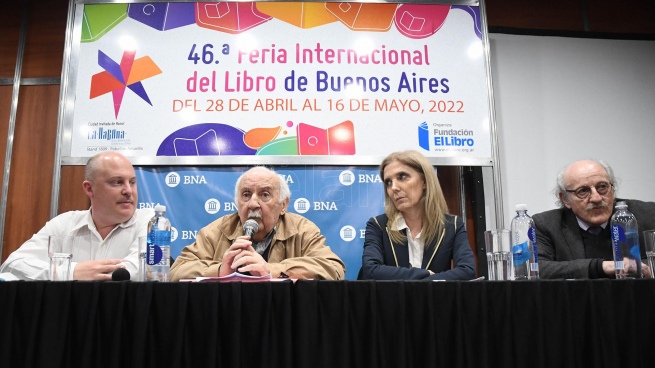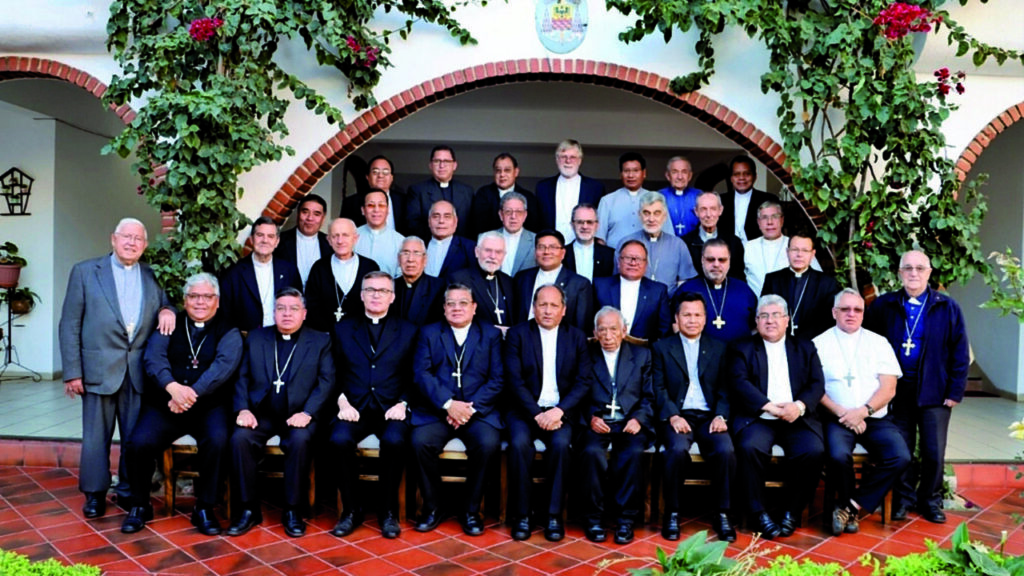The Argentine historian Norberto Galasso, together with the academician Maximiliano Molocznik, the president of Télam Bernarda Llorente and the director of Banco Nación, Guillermo Wierzba, presented a biographical book on Carlos Pellegrini entitled “Semblanza”, a work with which the researcher seeks to generate debate about the myths and misrepresentations that surrounded the figure of the lawyer and journalist who held the presidency of the country between 1890 and 1892.
In the presentation of the text held tonight in the Carlos Gorostiza room, the director of Banco Nación and moderator of the talk began by saying that the new text offers “a look at the things that are not known about Pellegrini” and added that the profile that Galasso elaborated “it can help the management of a bank that is based on the development of the nation of autonomy”.
“I accepted the proposal, with the materials I had on hand, which were not many, since when the pandemic came, (the head of government Horacio Rodríguez) Larreta closed the public libraries and since I did not know that, I went to the Miguel Cané library. , and it was closed and guarded by three nurses, so I couldn’t check some things due to the short time,” Galasso warned.
“Obviously this is another Pellegrini that we were taught about… This is part of so many lies that have been instilled in us for so long. Among these positive things that Pellegrini did, the Banco Nación was founded, its fundamental function is to give credit to small and medium industrialists “Norbert Galasso
“I arrived battered, hit by certain events that I am going to summarize: Covid chased by Sputnik, but on the fourth dose they gave me Pfizer, with which it was unified according to Carrió, because they introduced me to imperialism,” said the historian, between laughs and applause. A few days later, the researcher fell, “then the traumatologist told me ‘here we have to resort to applying magneto’, to which I replied ‘No, not Magnetto! I refuse!’ And he asked me to leave, ”said the historian, making a play on words in reference to the CEO of Clarín Héctor Magnetto.

“And to top it off, it turns out that one day before the presentation of this book, which tries to get as close as possible with the data available to Carlos Pelllegrini, my editor sends me an email with statements from (Javier) Milei – added-. It turns out that he says that the only man he admires in our history is Carlos Pellegrini. This adds to the difficulties, I have come this far with the weight of them, ”he said between a new chorus of laughter.
“It is a luxury and an honor to be able to present a text by Galasso, I read it as one takes the texts, knowing that he is going to learn a lot and his head is going to open,” said Bernarda Llorente during the presentation. “It is a text above all brave because it tries to draw back the curtains of schematism, of cancellation, of obviousness that one usually has in their historical view and also in the concepts one has about militancy”.
According to Llorente, in the historian’s recent work “everything that sounds similar to today is not a mere coincidence”. The doubts and contradictions that appear “have a lot to do with what has always happened to us, with our advances and setbacks,” he indicated.
“In ‘Semblanza’, Galasso describes a resonant, multifaceted and contradictory Pellegrini, with many things that are terrible and surprising at the same time for the time,” he said. “Dialectics has to be the way to understand the past that Norberto tells us but also to be able to process the future in a different way,” Llorente pointed out.
When the investigation began, the author of “Let’s be free and nothing else matters. Life of San Martín” came across the doctoral thesis that Pellegrini presented in 1869, where he wrote that “it was necessary to introduce free, secret suffrage and mandatory and that it should be extended to all women. This claim caught my attention because it is unusual in the men of his time, “said the historian.
“What can I tell you about the book? That Pellegrini spoke of defending the industry that was a fundamental objective of his life, that he began very young reading the El Plata magazine, his father wrote articles and ended in 1906 when he died supporting a party in which one of its main objectives was the industrialization of the country”, said Galasso.
The researcher’s story later focused on the crisis that hit the country in 1890. During this period, Pellegrini “realized that a national bank was needed that should have branches in the provinces to give them a boost. This President Pellegrini realizes that there are those who want private banks and those who want state banks and that a country that produced “only grass” could not develop. That industries were needed”, Galasso recounted about the protagonist of the book “Semblanza”.
The last times of Pellegrini’s life are between 1901 and 1906, the year in which he died. “It is important to bear in mind that some important issues are omitted,” Galasso warned. And he explained: “In 1901 Pellegrini broke with Roca and the National Autonomist Party, a party that took him back to Congress and curiously has three flags: suffrage, free, compulsory secrecy, industrial development and advancement of social legislation. Principles that coincide with the support that Pellegrini gives to Joaquín V. González”, narrated the historian.
“In 1905 a radical insurrection took place on February 4 and Pellegrini proposed amnesty,” Galasso continued, adding that “there is something else that draws attention that deserves to be taken into account because it is quite current: at that time Estanislao Zeballos published a law magazine “History and letters” and Pellegrini, who was already ill, asks for an article”.
It is a particularly courageous text because it tries to draw back the curtains of schematism, of cancellation, of obviousness that one usually has in his historical gaze and also in the concepts that one has about militancy”Bernarda Llorente
“In that article he criticizes the capitalist system,” said Galasso, surprised. In the article, the Argentine hero stated that “the current relationship between master and servant should disappear” and that “whoever owns the means of production and the workers” should receive the same.

“‘The factory cannot be,’ says Pellegrini, ‘a place of oppression where someone rules and the others obey, on the contrary, this situation must be modified because it provokes the reaction of the workers,’ read the historian.
Shortly after, the Argentine official dies. “The relatives want to make an almost private burial and yet an invasion of the town takes place in the cemetery that gives a popular character to this end of the life of Carlos Pellegrini”; Galaso said.
“Obviously this is another Pellegrini that we were taught about… This is part of so many lies that have been instilled in us for so long. Among these positive things that Pellegrini did, the Banco Nación was founded, its fundamental function is to give credit to small and medium industrialists “, concluded the historian.


















